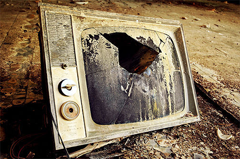
Starting this week, hundreds of U.S. television stations plan to shut down their analog broadcasts as they complete the transition to digital over-the-air broadcasts. While the U.S. had planned for a nationwide change this month, last-minute legislation has delayed the full mandatory transition until mid-June.
The U.S. experience to date highlights what should be a major concern for Canada -- the transition from analog to digital broadcasts is years behind the U.S. with virtually no industry or government support. This sounds like a purely technical issue, yet the policy implications of that transition will have a profound effect on both the national broadcast and telecom landscape.
The basic notion of the transition is fairly straightforward. For decades, Canadian broadcasters have used spectrum to transmit over-the-air analog broadcast signals. Before the widespread use of cable and satellite, many Canadians used antennae -- "rabbit ears" -- to access those broadcast signals. Today, approximately 10 percent of Canadians still rely on over-the-air television signals.
Early in the next decade, Canadian broadcasters are scheduled to complete the switch from analog to digital broadcasts. The shift to digital brings several advantages including better image and sound quality as well as more efficient use of spectrum that will open the door to new telecom services.
US two years ahead of Canada
The shift will require some significant investments, however, since broadcasters must phase out their analog transmitters in favour of new digital equipment. Regulators first hoped that broadcasters would voluntarily make the switch. In response to concerns that North American broadcasters were moving too slowly (several European countries have already transitioned from analog to digital), both the United States and Canada established mandatory deadlines under which the change must be completed.
While Canada and the U.S. negotiated an agreement on the digital television transition in 2000, the U.S. is now over two years ahead of Canada, with their mandatory transition set for June 12, 2009. By contrast, the Canadian deadline is August 31, 2011 (there are some exceptions for northern and remote communities).
Notwithstanding the longer Canadian phase-in period, there are mounting concerns that Canadian broadcasters will not be ready in time. Last year, Canadian Radio-television and Telecommunications Chair Konrad von Finckenstein delivered a stinging rebuke to the broadcasters, noting the paucity of digital transmitters in Canada and lamenting that "so far, the industry has not shown the sense of urgency that I think is called for right now."
Given the difficult economic climate, Canadian broadcasters are likely to lobby Industry Minister Tony Clement heavily for a deferral of the digital transition.
The shift will also have implications for Canadian consumers, who may need new equipment since televisions that do not feature a digital tuner will require a special set-top box in order to view the over-the-air digital signals. This additional cost could affect lower-income Canadians, who are also more likely to rely on the over-the-air signals rather than cable or satellite services.
US consumers get $1.5 billion in support
U.S. lawmakers have established a plan to support those in need of the digital equipment with a coupon program that subsidizes the cost. The program does not come cheap, with US$1.5 billion set aside to cover the cost of the program. At the moment, there are no similar plans in Canada. The CRTC has made it clear that consumer subsidies fall outside its statutory mandate and last week Canadian Heritage Minister James Moore told a House of Commons committee that there were no government plans to establish a consumer program.
While the digital transition may result in some challenges for broadcasters, the implications are even greater for telecommunications since an important by-product of the transition will be that much of the spectrum currently used by broadcasters for analog broadcasts will be freed up for other uses.
Next week's column will examine the potential for dramatic new uses of spectrum -- including more open networks and unlicensed "white spaces" that could foster new innovation and deliver wireless broadband services.
Related Tyee stories:
- Crystal Ball for Media Activism
A guess at when and how big digital decisions will go down in 2009. - How We Can Reinvent TV
The web now allows us to bypass the studios. At last, artists will run the shows. - TV 2.0
TV is dying. What will replace it?
Read more: Science + Tech















Tyee Commenting Guidelines
Comments that violate guidelines risk being deleted, and violations may result in a temporary or permanent user ban. Maintain the spirit of good conversation to stay in the discussion.
*Please note The Tyee is not a forum for spreading misinformation about COVID-19, denying its existence or minimizing its risk to public health.
Do:
Do not: